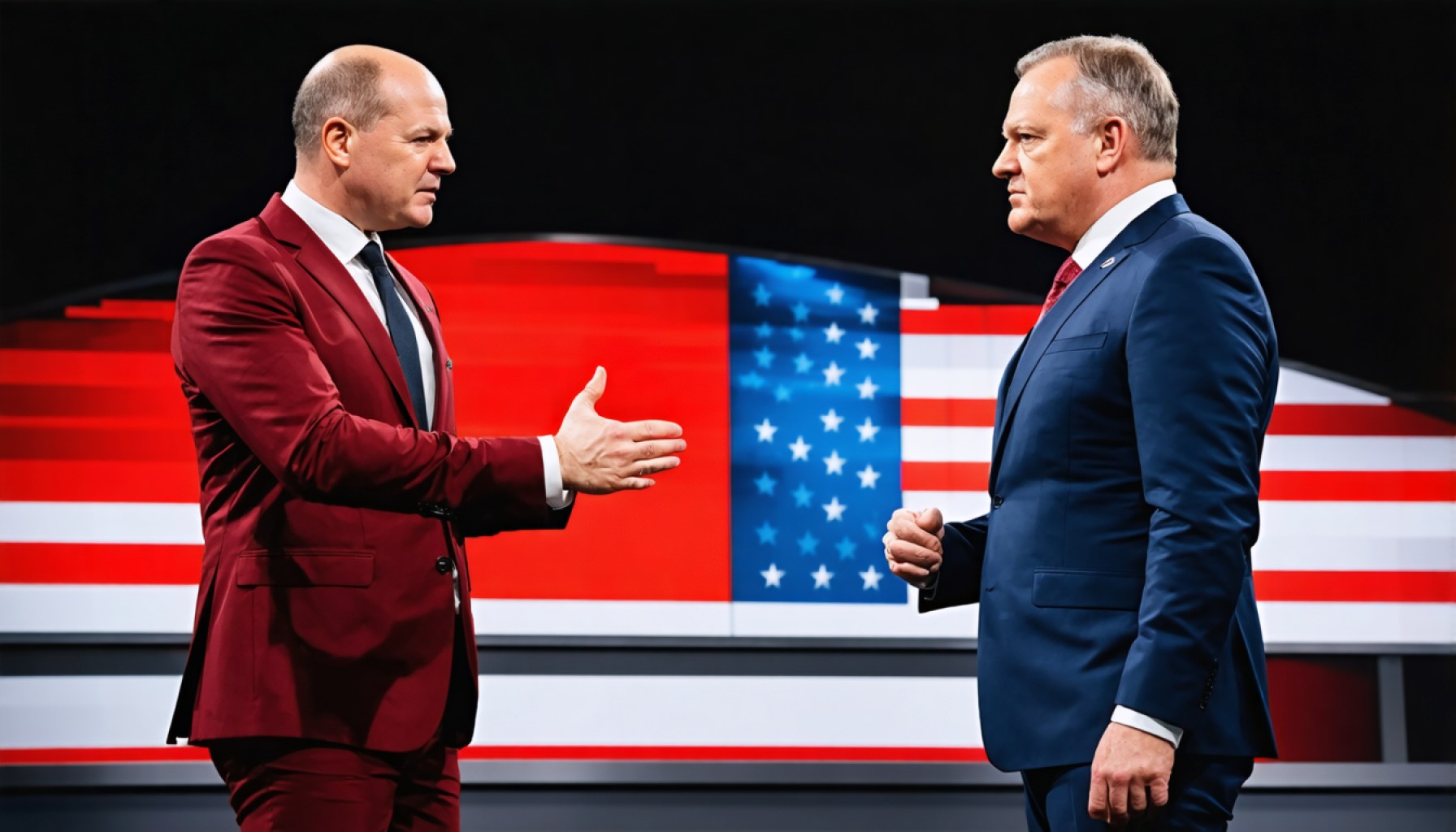- Germany’s political landscape in 2024 is marked by tensions within the Union and SPD.
- Friedrich Merz, backed by the Union, attempts to reshape his impulsive image to that of a composed statesman.
- Olaf Scholz faces challenges within the SPD, particularly after Boris Pistorius exits the race, leaving Scholz to navigate the political storm.
- The film Kanzler und Herausforderer vividly depicts the contrasting journeys and campaign strategies of Merz and Scholz.
- Scholz displays unexpected fervor, while Merz works to temper his restlessness for electoral success.
- The film features interviews offering insights into their careers and distinct political paths.
- As the decisive vote approaches, the outcome remains uncertain, influencing Germany’s future trajectory.
As autumn leaves prepared to fall in 2024, Germany’s political landscape simmered with tension. The Union boldly backed Friedrich Merz, a figure often characterized by his impatient and impulsive demeanor, poised to refine his image into a statesman-like figure. Meanwhile, whispers of discontent echoed within the SPD halls regarding Olaf Scholz’s candidacy. The departure of potential contender Boris Pistorius from the race left Scholz to face the electoral gale.
As the spotlight intensifies, Kanzler und Herausforderer, a film by Mathis Feldhoff and Andreas Huppert, plunges into the riveting narrative of two political titans. Scholz, typically reserved, erupts with uncharacteristic fervor and clarity, revealing a side unseen by the public eye. In contrast, Merz embarks on a quest to temper his known restlessness, attempting to project composure and authority.
The narrative paints vivid scenes of their campaign trail, capturing moments of meticulously planned rallies and the palpable tension on the day of the trust vote. Interviews with close allies and formidable opponents alike furnish insights into their storied careers and contrasting political paths. Scholz, a seasoned veteran of German politics, boasts vast governmental experience, yet his tenure as Chancellor has stumbled. Merz’s journey marks a stark difference; despite a rocky political start, his re-emergence after years in the corporate world symbolizes resilience.
The looming question lingers: can Merz maintain his lead until the decisive vote, or will Scholz defy the odds and reclaim political favor? As Germany watches, its future hangs delicately in the balance, shaped by these two compelling narratives.
Political Showdown: Merz vs. Scholz – The Battle for Germany’s Future
How-To Steps & Life Hacks: Becoming a Political Leader in Germany
1. Understand the Political Landscape: Dive into the structure and functions of Germany’s government. Familiarize yourself with key political parties like the SPD (Social Democratic Party) and the CDU/CSU (Christian Democratic Union/Christian Social Union).
2. Build a Strong Political Network: Connect with influential political figures and join relevant political organizations. Engage in community leadership roles to build a reputation.
3. Develop Public Speaking Skills: Effective communication is crucial. Attend workshops, participate in debates, and refine your message to connect with diverse audiences.
4. Craft a Compelling Image: As seen with Friedrich Merz and Olaf Scholz, personal branding is vital. Work on tempering negative perceptions and projecting qualities like composure and authority.
5. Stay Informed on Policies and Current Events: Understand issues that matter to the electorate, such as the economy, social policies, and international relations. Regularly update your knowledge to align your policies with public interests.
Real-World Use Cases: Leadership Styles in Action
1. Friedrich Merz: Known for his ambitious and business-oriented approach, his leadership style may appeal to corporate stakeholders and proponents of economic liberalism.
2. Olaf Scholz: His extensive experience in government provides a sense of stability during political volatility, making him appealing to voters favoring continuity and measured governance.
Market Forecasts & Industry Trends
With Germany being Europe’s largest economy, political stability is crucial for market forecasts. Analysts predict continuous growth in green technology and digital innovation sectors. Both candidates need to address these industries in their campaigns to win over business leaders and environmentally conscious voters.
Reviews & Comparisons
– Friedrich Merz: His business acumen is praised, but critics point to his impulsive nature, which may alienate cautious voters.
– Olaf Scholz: While experienced, Scholz faces criticism for a lack of dynamism. His leadership style is often viewed as too bureaucratic compared to Merz’s dynamic approach.
Controversies & Limitations
– Merz: His past corporate ties raise concerns about potential conflicts of interest and responsiveness to social policies.
– Scholz: His tenure as Chancellor has witnessed minimal transformative policies, leading to skepticism about his ability to adapt to the current needs of the populace.
Features, Specs & Pricing
Election campaigns are expensive. While exact figures fluctuate, a leading candidate often spends millions on advertising, rallies, and outreach. Transparency in campaign funding is crucial to maintain public trust.
Security & Sustainability
Security remains high on Germany’s agenda, especially with ongoing geopolitical tensions. Sustainability initiatives continue to be a major societal focus, requiring robust policies from candidates.
Insights & Predictions
Industry experts predict a close race, with emerging influences like climate change policies and digital innovation taking center stage in the debates. Voter sentiment is expected to shift in response to global economic trends and domestic social reforms.
Actionable Recommendations
1. Engage with Candidates: Attend town halls and talks to better understand candidate positions.
2. Stay Informed: Follow credible news sources for updates on campaign tactics and promises.
3. Exercise Your Right to Vote: Participate in shaping your country’s future by voting for the candidate whose values align with your own.
For additional insights into Germany’s political scene, visit the main domain of the CDU/CSU or SPD to explore party platforms and policy proposals.
